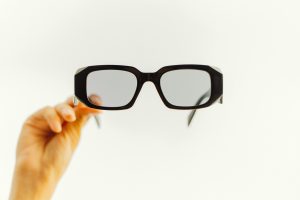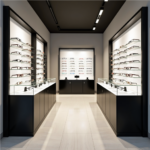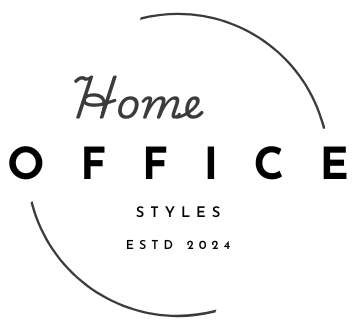Many people now consider blue light blocking glasses essential in a world filled with digital screens.
Our reliance on devices often leads to prolonged exposure to high-energy visible light.
This specific spectrum, widely called blue light, may fatigue the eyes over time.
Headaches, blurred vision, and restless nights can follow excessive screen use.
Blue light blocking glasses aim to lessen this daily strain. They filter a portion of the high-energy wavelengths that affect sleep and eye health. Some versions also include anti-reflective coatings for clearer views. Wearers frequently report reduced headaches and improved relaxation before bed.
Opinions on their true effectiveness vary among experts. Certain studies suggest possible benefits for comfort and sleep regulation. Others point to limited data or advocate balanced screen habits instead. Still, many users share positive experiences with these lenses.
In this guide, we’ll explore the science behind blue light blocking glasses in detail. We’ll discuss their potential advantages and highlight any drawbacks. By the end, you’ll know if they’re a worthwhile addition to your daily routine.
Understanding Blue Light
Blue light exists in the high-energy visible spectrum. It comes primarily from digital screens, LED bulbs, and even sunlight. In many cases, this wavelength can overstimulate the eyes. Frequent exposure might lead to eye strain and restless evenings.
 Some experts see blue light as a sleep disruptor. It may slow melatonin production, which is crucial for healthy rest. Individuals who view screens late at night often experience trouble winding down. These issues are why many turn to blue light blocking glasses for relief.
Some experts see blue light as a sleep disruptor. It may slow melatonin production, which is crucial for healthy rest. Individuals who view screens late at night often experience trouble winding down. These issues are why many turn to blue light blocking glasses for relief.
Scientific opinions on the severity of blue light risks differ. Some researchers believe balanced screen habits remain the best solution. Others support using specialized lenses to minimize potential harm. Either way, most agree that moderation is wise, especially before bedtime.
Blue light blocking glasses aim to filter out harmful wavelengths. They may help the eyes relax during extended screen use. Clear or tinted lenses offer varying levels of filtration. Wearers often report reduced glare, dryness, and headaches.
Key Features of Blue Light Blocking Glasses
Many glasses use specialized lens coatings to filter high-energy wavelengths. These coatings often reduce glare and reflections from screens. Some lenses include anti-scratch layers for added durability. Others feature tinted designs that shield eyes from intense blue light.
Frame quality also matters for everyday comfort. Lightweight materials reduce pressure during extended wear. Adjustable nose pads help glasses stay securely in place. A comfortable fit can encourage consistent use throughout the day.
Certain models block varying percentages of blue light. Higher filtration can intensify tints and alter color perception. Lower levels might balance clarity and protection. Your choice depends on personal preference and work requirements.
A lot of brands offer both prescription and non-prescription options. This flexibility helps users address vision correction and blue light concerns together. Style choices also vary, from sleek metal frames to bold acetate designs. That variety lets people find glasses that fit their personal taste.
Benefits of Blue Light Blocking Glasses
Many people report reduced eye strain after using these glasses. Some also experience fewer headaches during extended screen sessions. Lower exposure to blue light may help maintain a steady sleep routine. Improved melatonin regulation could support deeper rest at night.
These glasses may minimize glare from bright screens. Less glare often means less squinting and fewer tired eyes. They can also enhance visual comfort in brightly lit offices. For those with sensitive eyes, this benefit can be significant.
Certain users see a drop in late-evening alertness. They feel more relaxed and ready for sleep as bedtime approaches. By wearing them consistently, they may adopt healthier nighttime habits. Blue light blocking glasses can become part of a regular wind-down routine.
Despite positive feedback, results may vary between individuals. Many factors influence sleep quality and eye comfort overall. Still, the potential advantages make these glasses worth considering. Those seeking relief might find them a practical, everyday solution.
Potential Drawbacks of Blue Light Blocking Glasses
Not everyone notices immediate relief from using these lenses. Results can vary depending on the specific filter level. Some frames or coatings may distort colors more than desired. This distortion can frustrate professionals who need precise color accuracy.
Certain pairs can feel heavier or bulky after long wear. High-quality coatings might raise the overall cost significantly. Budget-friendly glasses may lack durability or adequate lens protection. Limited scientific consensus leaves some experts skeptical about their true impact.
Maintenance can also be a concern for frequent users. Coated lenses require gentle cleaning to avoid scratches. Improper handling may reduce their protective benefits over time. Regular inspections help ensure that filters remain effective.
How to Choose the Right Pair

Always check your daily screen time to gauge the needed filtration level. Heavier filtering may suit late-night work, while moderate options fit casual use. Check product details for actual percentages of blue light blocked. Consider whether you need prescription lenses combined with protective coatings.
Test different frame shapes to ensure a secure, comfortable fit. Look for anti-glare and scratch-resistant coatings for added clarity. Check various brands for price variations, lens quality, and warranties. Read reviews for real-world insights on comfort and longevity.
Budget-friendly pairs can suffice, but premium options might last longer. Take advantage of return policies to find a pair that meets your needs. Prioritize lens quality to maximize any potential benefits. Ultimately, choose glasses that suit your eyes, lifestyle, and budget.
Conclusion
Blue light blocking glasses can help manage screen-related eye strain. They may also support better sleep patterns and comfort. However, their actual benefits can vary from one person to another. Cost, lens quality, and design all factor into overall user satisfaction.
Balancing screen time remains crucial for overall well-being. Yet these glasses may offer a valuable layer of protection. Be sure to research brands, read reviews, and test different lens types. Doing your research will help you find a pair that meets your needs.
Blue light blocking glasses are just one tool. Healthy habits like regular breaks and mindful screen use matter too. Together, these strategies form a comprehensive approach to eye health. For many, this combined effort makes a noticeable difference in daily comfort.
Frequently Asked Questions
Q: Do these glasses work if I use night mode on devices?
They can still help, especially if night mode lacks strong blue light filtration.
Q: Can tinted lenses cause color distortion for design tasks?
Yes, strong tints sometimes alter color perception, which may disrupt precise editing work.
Q: Do I need prescription blue light blocking glasses if I have perfect vision?
Non-prescription options exist for those who only seek protective benefits.
Q: How often should I clean the lenses?
Regular cleaning with a microfiber cloth can prevent scratches and smudges.
Q: Are expensive brands always better for blocking blue light?
Not necessarily, but pricier models often use higher-quality coatings and materials.
Q: Can these glasses cure insomnia?
They may help, but underlying sleep issues can involve multiple factors beyond blue light.
Q: Is taking screen breaks still important if I wear these glasses?
Yes, breaks remain vital for overall eye health and reducing digital fatigue.
Q: What percentage of blue light should a lens block?
Many recommend 30–50% for daytime use, while higher levels suit late-night viewing.
Q: Should children wear blue light blocking glasses?
It depends on screen habits and professional advice from an optometrist.
Q: Can I wear them all day?
Most pairs are safe for extended wear, but check comfort and lens quality.



